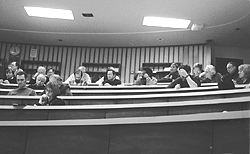

Tuesday's College Faculty (CF) meeting was dominated by discussion of the College Faculty Council's (CFC) decision to eliminate summer stipends for new faculty members and replace them with research portfolios worth $4000.
Faculty disputed the decision on both procedural and substantive grounds.

The CFC decided to eliminate the summer stipends, according to dean of the College of Arts and Sciences Clayton Koppes, because the practice of awarding them was outdated and financially unsound.
"If all the tenure track positions were filled there would simply not be enough money to fund new hires summer stipends," Koppes said. "The college's budget would be about $180,000 short of amount for summer stipends."
The stipends are 2/9 of a faculty member's begining salary. According to Koppes, not all stipends have been paid in recent years because of budget constraints.
Stipends were introduced in the early eighties as a result of recomendations contained in a document called the Tenure Report. Koppes said the sheer volume of new hires has rendered the system obsolete.
Koppes said, "The critical thing is ensuring our initial salary offers are comprable with other schools and salaries advance at a level comparable with other schools. Problems we've had is while initial offers were comparable, raises fell behind. Summer stipends may have actually masked that effect to some extent."
Discussion at Tuesday's College Faculty meeting centered around the fact that the faculty council bypassed the concerns of the General Faculty.
Piron said, "This is not an issue of money. It is an issue of basic blatant disrespect for faculty governance and should not have happened. If this issue had been brought to the general faculty, I'm sure we would have voted in its favor, but the fact that this was not proposed tot the General Faculty is a very serious issue and the fact that it was finalized without our knowledge was unfair."
"Standing offers should not be made without approval of faculty," said Piron. Piron cited that this decision is the "center of the collapse of faculty governance. We simply cannot take council legislation at face value if it has procedural violations."
According to Koppes, after the CF voted to adopt the Tenure Report, the CFC implemented and rescinded specific recomendations without consulting the CF.
Faculty members voted to place the question of summer stipends first on the April agenda.
Professor of Biology Yolanda Cruz urged that the issue be addressed quickly. "What about people that are currently being hired? Won't there be some dissatisfaction later? There is an urgency to decide as soon as possible," Cruz said.
The motion to establish a committee on teaching (COT) passed without audible dissent. The committee will act as a resource for teachers and will work in conjunction with the Educational Planning and Policies Committee (EPPC).
"There's so much creativity within the Oberlin faculty about teaching," College President Nancy Dye said. "Mainly you learn about teaching by hook or by crook. You also learn by trial and error, but there's very little real mentoring in graduate programs about teaching. You develop your own ways. You can be doing all sorts of wierd things, and no one will tell you."
Dye said she belived COT would provide a valuable resource for teachers.
The CF voted to re-establish the Excellence in Teaching Awards. These $3000 awards will be available for up to three faculty members, beginning this Spring.
Faculty debates: As its Tuesday meeting, the College Faculty discussed eliminating summer stipends, as well as the new Committee on Teaching. (photo by James Cochran)
Copyright © 1998, The Oberlin Review.
Volume 126, Number 17, March 6, 1998
Contact us with your comments and suggestions.